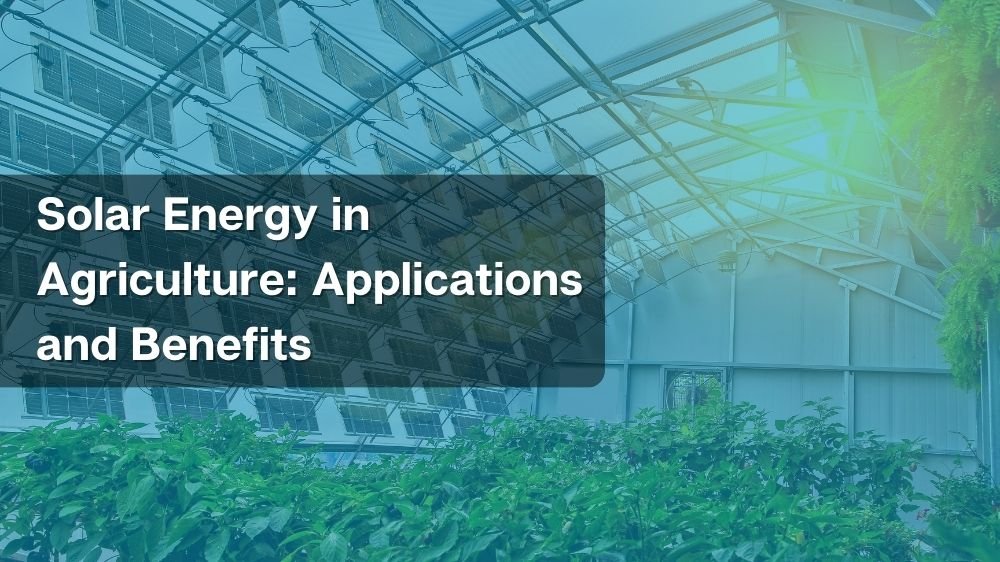Introduction
In recent years, solar energy has gained significant attention as a sustainable and efficient power source for various industries. One sector that has embraced this renewable energy source with open arms is agriculture. Solar energy in agriculture not only addresses the environmental concerns associated with traditional farming practices but also offers a multitude of economic and operational benefits. In this technical blog, we will explore the applications and benefits of solar energy in agriculture.
Understanding Solar Energy in Agriculture
Solar Photovoltaic (PV) Systems
Solar energy in agriculture is primarily harnessed through solar photovoltaic (PV) systems. These systems consist of solar panels, which capture sunlight and convert it into electricity. The electricity generated can be used for various on-farm operations, including irrigation, lighting, and running machinery. The integration of solar PV systems into agriculture is often referred to as “solar farming.”
Applications of Solar Energy in Agriculture
- Irrigation
One of the most significant applications of solar energy in agriculture is for irrigation purposes. Solar-powered water pumps can efficiently draw water from wells, rivers, or reservoirs and distribute it to fields, ensuring consistent water supply for crops. This reduces dependence on expensive diesel generators or grid electricity, making irrigation more cost-effective and sustainable.
- Crop Drying
In many agricultural practices, crops need to be dried before storage or further processing. Solar dryers utilize the sun’s energy to dehydrate crops, preserving their quality and reducing post-harvest losses. These solar dryers are especially valuable in regions with abundant sunlight.
- Farm Electrification
Solar PV systems can electrify farms, providing power for various applications such as lighting, cooling, and running agricultural machinery. This reduces reliance on fossil fuels and minimizes energy costs for farmers, contributing to both economic and environmental sustainability.
- Cold Storage
Solar energy can also be used to power refrigeration systems for cold storage facilities. This is crucial for preserving perishable agricultural products like fruits, vegetables, and dairy products. Solar-powered cold storage systems are particularly beneficial in off-grid or remote areas.
- Pest Control
Solar energy can be used for pest control in agriculture through the installation of solar-powered pest deterrent devices. These devices emit sound or vibrations to keep birds and rodents away from crops, reducing crop damage.
Benefits of Solar Energy in Agriculture
- Cost Savings
Implementing solar energy systems on farms can lead to substantial cost savings in the long run. Reduced energy bills, lower maintenance costs, and government incentives or subsidies make solar a financially attractive option for farmers.
- Energy Independence
By generating their own electricity, farmers become less reliant on external energy providers. This independence is particularly valuable in remote areas where grid access is limited or unreliable.
- Reduced Environmental Impact
Solar energy is a clean and renewable energy source, which means it produces no greenhouse gas emissions or air pollutants. By adopting solar technology, agriculture can significantly reduce its carbon footprint and contribute to a more sustainable future.
- Increased Farm Resilience
Solar-powered irrigation and cold storage can help farmers adapt to changing climate conditions and improve their resilience against water scarcity and temperature fluctuations.
- Government Support
Many governments worldwide offer incentives, tax credits, and subsidies to encourage the adoption of solar energy in agriculture. These incentives can make solar investments even more appealing for farmers.
- Improved Crop Quality and Yield
Solar-powered irrigation ensures a consistent water supply, leading to improved crop quality and increased yields. This can translate into higher profits for farmers.
Conclusion
The integration of solar energy in agriculture offers a promising path toward sustainable and efficient farming practices. With a wide range of applications and numerous benefits, solar technology not only reduces the environmental impact of agriculture but also enhances the economic viability and resilience of farms. As technology continues to advance and governments promote renewable energy initiatives, solar energy will play an increasingly crucial role in shaping the future of agriculture. Farmers who embrace solar energy today are not only investing in their own prosperity but also contributing to a greener and more sustainable planet.


